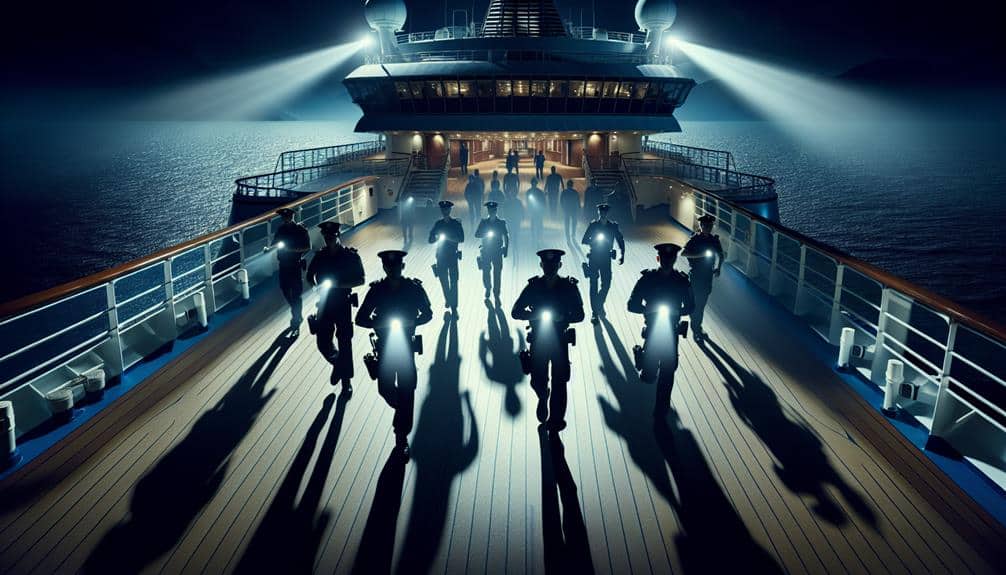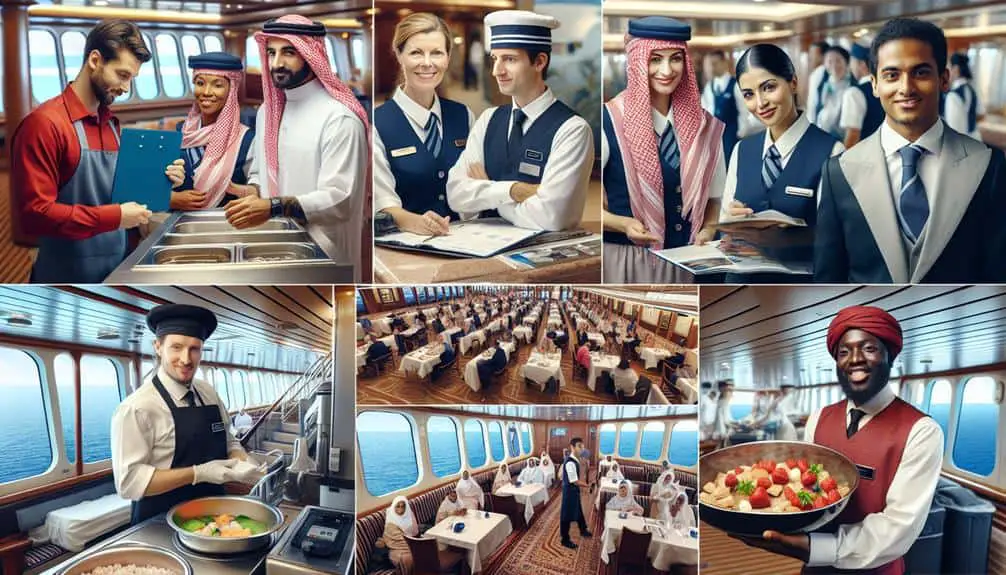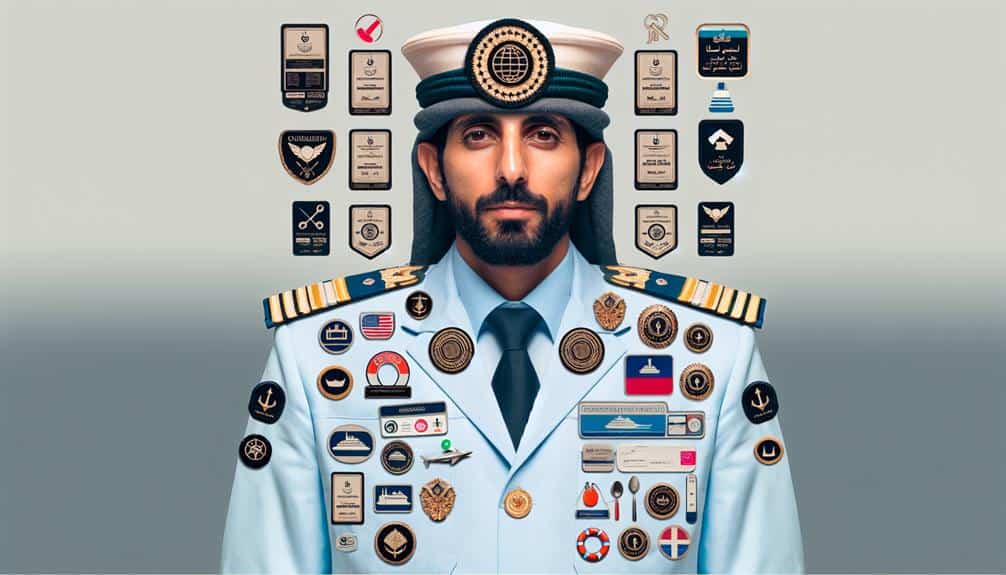Security teams on cruises are essential due to the diverse risks and threats present at sea. The structured team, equipped with efficient communication and training, assesses vulnerabilities and takes a proactive approach to enhance safety. Surveillance tactics, like CCTV and real-time monitoring, bolster security readiness. In emergencies, swift protocols and clear communication channels are crucial. Collaborations with law enforcement elevate response capabilities. Passenger and crew safety protocols, including specialized training and regular drills, guarantee all onboard are prepared. Knowing the critical role security teams play on cruises sets the stage for a deeper understanding of maritime safety measures.
Key Points
- Ensure safety of passengers and crew
- Efficient communication and information flow
- Swift emergency response and crisis management
- Collaborate with law enforcement for enhanced security
- Implement safety protocols and training for all personnel
Security Team Structure on Cruise Ships
When boarding a cruise ship, you'll notice a well-organized security team structure in place to guarantee the safety and security of all passengers and crew members. Team communication is a fundamental aspect of this structure, ensuring that information flows efficiently between security personnel to address any emerging threats promptly. Staff training plays an essential role in preparing security teams to handle diverse situations effectively. Through thorough training programs, security staff are equipped with the necessary skills to assess risks and prevent potential threats proactively.
Risk assessment is a vital component of the security team's responsibilities. By conducting detailed evaluations of onboard areas and activities, security personnel can identify potential vulnerabilities and develop strategies to mitigate them. This proactive approach enhances the overall safety of the cruise ship environment.
In addition to risk assessment, security teams focus on threat prevention by implementing security protocols and procedures that deter malicious activities before they occur. This preventative mindset is critical in maintaining a secure and enjoyable experience for all passengers and crew members aboard the cruise ship.
Surveillance and Monitoring Duties
Surveillance and monitoring duties on cruise ships are essential for maintaining a secure environment and swiftly detecting any potential security threats. Risk assessment plays a pivotal role in determining the areas that require heightened surveillance. Security teams conduct thorough risk assessments to identify vulnerabilities and establish effective monitoring strategies.
By monitoring key areas such as passenger decks, common areas, and restricted sections, security personnel can proactively detect any suspicious activities or individuals. Utilizing advanced surveillance technology, such as CCTV cameras and access control systems, enhances threat detection capabilities and enables security teams to respond promptly to any security breaches.
Continuous monitoring allows for real-time assessment of potential risks, ensuring a proactive approach to security management. By integrating risk assessment practices into surveillance protocols, cruise ships can maintain a high level of security readiness and effectively mitigate security threats before they escalate.
Emergency Response and Crisis Management
To effectively manage emergency responses and crises on cruise ships, security teams must establish robust protocols and procedures that guarantee swift and coordinated actions in high-stress situations. Incident response is a critical aspect of emergency management on cruises. Security teams should be well-versed in identifying, evaluating, and responding to various incidents, ranging from medical emergencies to security threats.
Communication strategies play a pivotal role in crisis management aboard cruise ships. Clear and efficient communication channels must be established to make sure seamless coordination among security personnel, crew members, and passengers during emergencies.
During crises, security teams need to activate predefined response protocols promptly. These protocols should outline roles and responsibilities, evacuation procedures, and methods for containing and resolving the situation. Regular training drills and simulations can help security teams familiarize themselves with these protocols and enhance their preparedness for real-life emergencies.
Effective incident response and communication strategies are essential components of a thorough emergency response plan that guarantees the safety and well-being of everyone on board a cruise ship.
Collaborations With Law Enforcement
Collaborating closely with law enforcement agencies enhances the overall security preparedness and response capabilities of cruise ships. To facilitate effective collaborations, cruise ship security teams must meet specific training requirements to align with law enforcement standards. Training programs should cover areas such as emergency response protocols, investigative techniques, and legal procedures to guarantee seamless cooperation during security incidents.
Communication strategies play a crucial role in fostering successful partnerships between cruise ship security teams and law enforcement agencies. Establishing clear lines of communication, utilizing encrypted channels for sensitive information sharing, and conducting regular joint training exercises can enhance coordination and response effectiveness in various security scenarios. Additionally, establishing formalized procedures for reporting incidents and sharing intelligence can streamline information flow and improve decision-making processes during critical situations.
Passenger and Crew Safety Protocols
Enhancing passenger and crew safety protocols is crucial for ensuring the overall security and well-being onboard cruise ships. To achieve this, thorough training programs are essential for both passengers and crew members. Passengers should receive clear instructions on emergency procedures, including mustering locations and evacuation routes.
Crew members need specialized training in crowd management, conflict resolution, and first aid to effectively handle any potential incidents.
Incident prevention is a key focus of safety protocols onboard cruise ships. Regular drills and exercises help familiarize both passengers and crew with safety procedures, ensuring a swift and coordinated response in case of emergencies. Crew members are trained to identify and address potential safety hazards proactively, minimizing risks to passengers and the vessel.
Frequently Asked Questions
How Are Security Team Members Trained and Vetted Before Being Hired on a Cruise Ship?
To become a security team member on a cruise ship, you undergo a rigorous training process focusing on emergency response, conflict resolution, and surveillance techniques. Background checks are meticulously conducted to guarantee your suitability for the role.
Are There Specific Protocols in Place for Handling Medical Emergencies Onboard a Cruise Ship?
In case of medical emergencies on a cruise ship, specific protocols are in place. The security team is trained to handle such situations, guaranteeing swift communication, coordination, and assistance. This secures passenger safety and well-being.
How Does the Security Team Handle Incidents Involving Unruly Passengers or Criminal Activity?
When handling incidents involving unruly passengers or criminal activity, the security team on cruises swiftly responds to guarantee passenger safety. They employ emergency protocols, detain suspects, and work with authorities to address and resolve the situation effectively.
What Measures Are in Place to Protect Passengers' Personal Belongings While on a Cruise?
To guarantee passenger safety and theft prevention on cruises, security teams implement surveillance systems, secure locks on cabins, and conduct regular patrols. These measures safeguard personal belongings, providing peace of mind for passengers throughout their voyage.
How Does the Security Team Communicate and Coordinate With Other Departments on the Ship in the Event of an Emergency?
During an emergency response on a cruise ship, the security team uses efficient communication channels to coordinate with other departments. Interdepartmental teamwork is crucial to guarantee a prompt and effective response to any onboard crisis.




